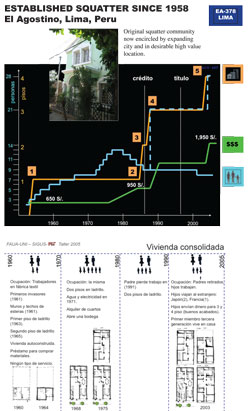Three levels of surveys are anticipated in a full understanding of incremental housing.
- For the initial understanding, the focus is on LEVEL I, which would be the basis for an initial comparison with other areas. The B4 survey sheet (approximately 8 1/2” x 14”) would be enlarged to B2 (approximately 20” x 30”) for display as background for discussion.
LEVEL I: HOUSE
Focus is on the individual house and the trigger - the catalyst - for the process, linked to family size and circumstance, income and time. A simple but powerful graph charts the changes and quickly provides a comparative reference for other areas and various types of housing programs. The interest is the physical expansion of the house, with a room as the minimum step. Qualitative improvements ot the house - better finishing, painting, new windows, etc. - are not sufficient. Room additions are often built in stages; i.e., addition of a wall, building of floor, etc. but for the survey the date of completion would be registered. In the graph, a sloping line would indicate graduate construction.
LEVEL II: AREA
Focus is on the area - the community, the neighborhood, the settlement - which predominately grows through incremental house construction. Determination of the various degrees of build-outs of individual houses, their percentage, their location in a community - whether in high value, high activity areas generally along main streets or interior locations. Determination of infrastructure provision - if provided after original occupation of the area, whether through formal upgrading or as part of staged provision in various planned programs, for example site and services.
LEVEL III: CONTEXT
Focus on the city context of the area. City economic situation, management capacity and regulatory capacity. Rules, regulations concerning building and zoning. Financing availability. Existing support programs.

